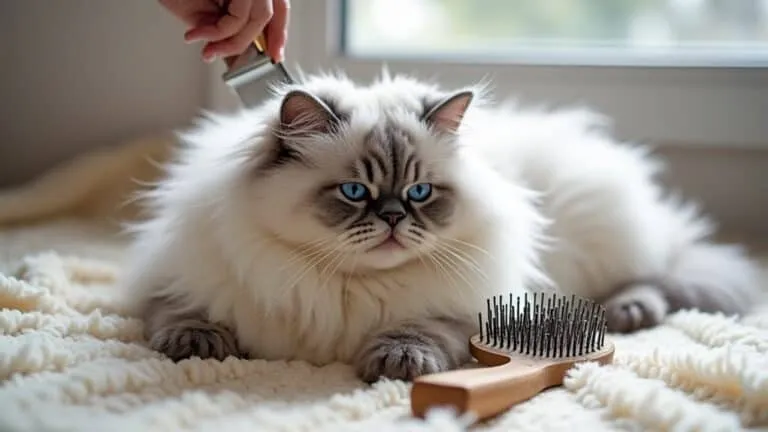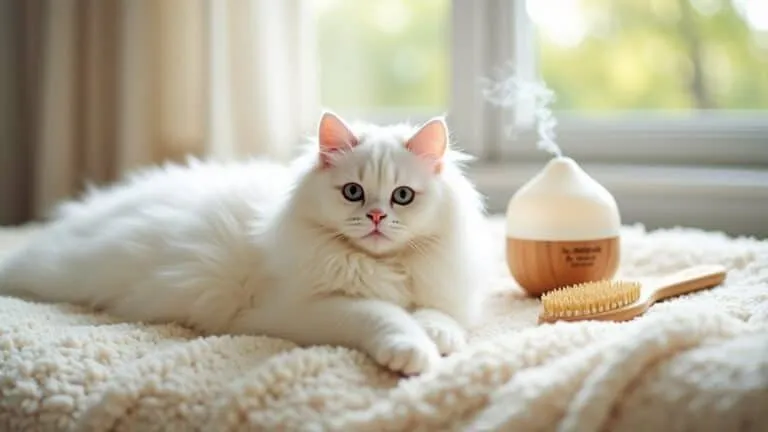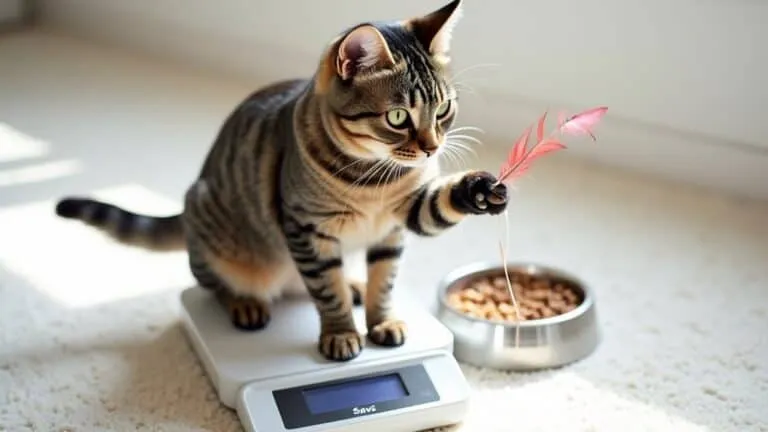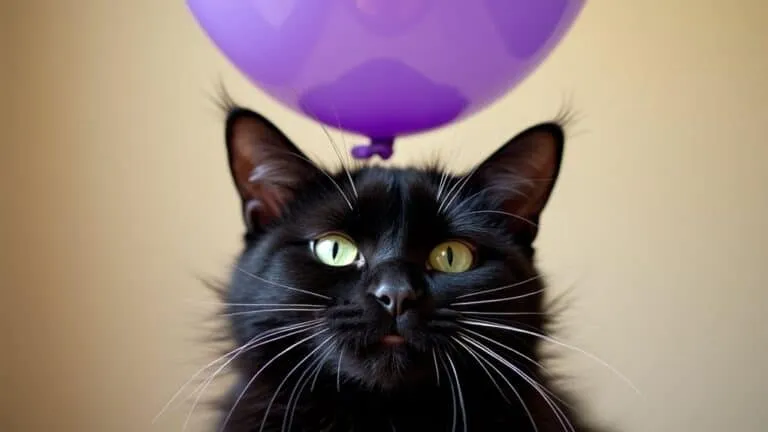The Best Fluffy Pancakes recipe you will fall in love with. Full of tips and tricks to help you make the best pancakes.
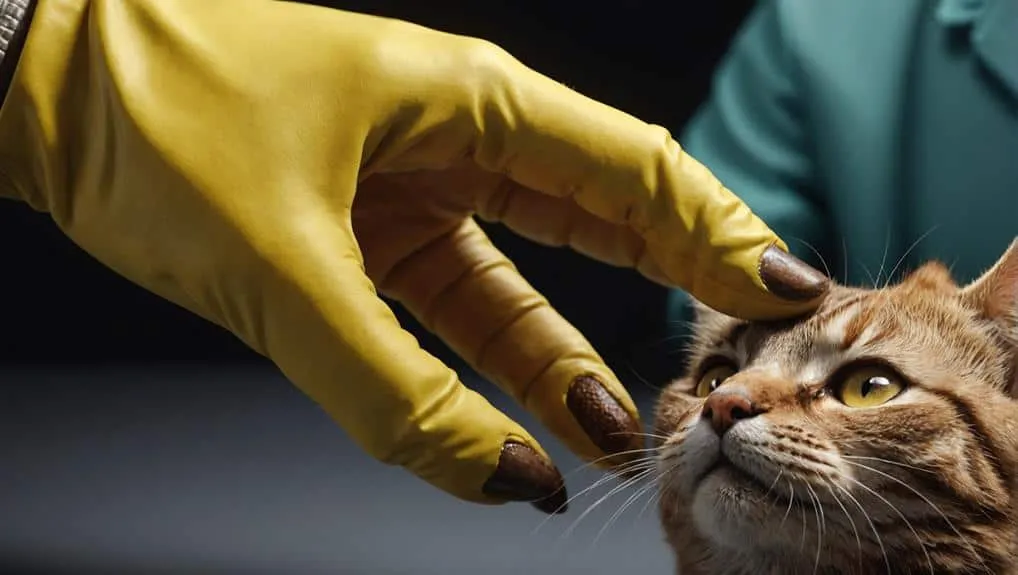
So, you've got a stinky situation on your hands – literally. When your cat's anal glands aren't expressing properly, things can get pretty uncomfortable and smelly.
Normally, these glands secrete a pungent fluid during bowel movements, which helps mark territory and communicate with other cats. But when the glands get clogged or infected, it leads to some pretty obvious signs – like excessive licking, scooting, and a bad odor that's hard to ignore.
To tackle this issue, it's crucial to understand why expression is important, recognize the signs of problems, and look into treatment and prevention strategies.
By doing so, you'll gain a better understanding of how to give your cat the relief and care they need to feel more comfortable and happy.
Understanding Cat Anal Glands
So, you're probably wondering what those two small things are around your cat's anus. Well, they're called anal glands or anal sacs, and they secrete a stinky fluid that helps your cat mark its territory and communicate.
Normally, this fluid comes out when your cat poops, but sometimes these glands can get clogged up or infected, causing discomfort and some pretty weird behaviors.
If you notice your cat licking its butt way too much, scooting around, or smelling really bad, it might be a sign that something's wrong with its anal glands.
To avoid these problems, it's super important to take your cat to the vet regularly, especially if it's had issues with its anal glands before or has some physical traits that make it more prone to problems.
By knowing how anal glands work, you'll be better able to spot potential health issues and take care of them before they get worse.
Function and Importance of Expression
So, you're about to dive into the world of expression and its importance.
You'll soon realize that it's a crucial part of your cat's natural behavior and overall health.
Understanding how expression works naturally helps you appreciate the benefits of manual expression in preventing anal gland problems.
Regular expression can make a huge difference in your cat's comfort and well-being.
Natural Expression Process
So, your cat's anal glands are supposed to express fluid when they poop. This is a natural process that helps them mark their territory and communicate with other cats. It's also important for keeping their anal glands healthy and preventing discomfort and chronic issues.
| Natural Expression Process | Benefits |
|---|---|
| Anal glands express fluid during defecation | Prevents discomfort and chronic issues |
| Promotes healthy bowel movements | Reduces need for manual expression |
| Supports scent marking and territory communication | Maintains anal gland health |
As a cat owner, you should make sure your cat's anal glands are expressing naturally. One way to do this is by providing a high-fiber diet or products like Glandex, which can help promote healthy bowel movements. Regular vet check-ups are also a good idea, as they can help catch any potential issues before they become chronic. If your cat is experiencing discomfort or impacted anal glands, you should talk to a vet about manual expression and other treatment options.
Manual Expression Benefits
Manual expression of your cat's anal glands is super important for preventing discomfort, infections, and other complications that can arise from impacted or clogged glands. When you do it regularly, you can relieve discomfort and prevent potential infections caused by impacted or clogged glands, which guarantees your cat's overall well-being.
One of the benefits is that it helps maintain a stable consistency of their secretions, which reduces the risk of future blockages. This is especially important for cats that are prone to chronic anal gland issues. Some breeds are more likely to have anal gland complications, so they may need more frequent assistance.
It's crucial to consult with a veterinarian before attempting to express your cat's anal glands at home. They can show you the correct techniques to make sure it's done safely and effectively. If you're not comfortable doing it yourself, a vet can do it for you, which reduces the risk of trauma or pain that can happen when it's done incorrectly.
Signs of Anal Gland Problems
So, how do you know if your cat has anal gland problems? As a responsible pet owner, it's really important to recognize the signs of anal gland problems so you can get your cat the help they need before things get worse.
If your cat is excessively licking or biting their anal area, that's a big red flag. You might also notice them scooting around on the floor or a strong, unpleasant smell coming from their back end. These are all common signs that something is wrong.
If you see redness, swelling, or discharge around their anus, that means there's an infection or blockage that needs to be taken care of right away. You'll need to get your cat to the vet ASAP.
You might also notice that your cat is having accidents outside the litter box. This can be a behavioral response to the discomfort they're feeling due to impacted or infected anal glands.
Other signs to watch out for include straining during defecation or making pain noises while going to the bathroom. If your cat's anal glands are swollen, they're going to be in distress, and you'll want to get them to the vet as soon as possible.
Additionally, if your cat is acting differently – like they're more irritable or lethargic than usual – it could be related to anal gland problems. By keeping an eye out for these signs, you can get your cat the help they need and put an end to their suffering.
Treatment and Prevention Strategies
When it comes to dealing with your cat's anal gland issues, it's essential to understand the importance of getting a proper diagnosis and treatment from a vet. They can help you figure out what's going on and come up with a plan to make your cat feel better.
There are also different methods for expressing your cat's anal glands, which can be a bit of a challenge. You'll want to learn about the different options and find what works best for you and your cat.
In addition to these more hands-on approaches, it's also a good idea to think about how nutrition and supplements can help keep your cat's anal glands healthy. By considering all of these factors, you can put together a solid plan for preventing and managing anal gland problems in your feline friend.
Veterinary Diagnosis and Treatment
When it comes to diagnosing and treating anal gland problems in your cat, your veterinarian is crucial. They typically use a combination of physical examination, medical history, and diagnostic tests to figure out what's causing the issue.
Regular check-ups with your vet are super important for catching anal gland problems early on. They can identify things like infections, impactions, or tumors that need to be treated.
If your cat is having anal gland issues, your vet might prescribe antibiotics and anti-inflammatory meds to help with discomfort and fix the underlying problem. In cases where the issue is ongoing, they might suggest manually expressing the glands or even surgery, like a sacculectomy, to prevent future problems.
If you notice your cat is having trouble pooping or seems to be in pain, you should get them to the vet right away. This ensures they get the help they need quickly and effectively.
Anal Gland Expression Methods
So you want to know about anal gland expression methods for your cat. Let's dive in!
Regularly expressing your cat's anal glands can help prevent complications and keep them healthy overall. But it's crucial to work with a veterinarian to create a plan that's tailored to your cat's specific needs.
Don't try to express your cat's anal glands yourself – it should only be done by a trained professional to avoid causing discomfort or harm.
Regular check-ups with your veterinarian are essential to monitor your cat's anal gland health. This helps detect any issues early on, like blockages or infections, and prevents them from becoming more serious problems.
A high-fiber diet can also promote healthier bowel movements, reducing the likelihood of anal gland complications and the need for manual expression.
Keep an eye out for signs that your cat might need veterinary attention, such as excessive licking, scooting, or foul odors. These could indicate that their anal glands need to be checked or expressed.
Nutritional Support and Supplements
So, you want to support your cat's anal gland health? One effective way to do this is through targeted nutritional strategies and supplements that promote digestive regularity and natural secretion release.
For instance, introducing high-fiber cat food into their diet can be super helpful. This type of food helps maintain firm stool, which aids in the natural expression of the anal glands during defecation.
Another great option is to add nutritional supplements like Glandex to their diet. These supplements improve anal gland health by promoting consistent bowel movements and supporting natural secretion release with their fiber-rich formulas.
Probiotics can also be a game-changer. They enhance gut health and improve stool consistency, reducing the risk of anal gland impaction in cats prone to digestive problems.
In addition to diet changes, incorporating products specifically designed for anal gland health, such as Glandex wipes and medicated sprays, can assist in maintaining anal area hygiene and preventing infections.
Just remember, it's crucial to consult with a veterinarian before making any dietary changes or introducing supplements. This ensures peak digestive health and effective management of anal gland issues.
Glandex Products for Anal Gland Health
Glandex products provide a comprehensive solution for maintaining your cat's anal gland health. They offer a range of natural supplements and hygiene tools that promote regular bowel movements and prevent blockages.
Incorporating Glandex products into your cat's daily routine can really make a difference in their health. For example, the Glandex powder supplement can be easily mixed into their food to increase their fiber intake, which is essential for healthy anal glands. This supplement is made with natural ingredients like pumpkin and fiber, making it a safe and effective way to support your cat's digestive health.
In addition to the supplement, Glandex also offers medicated sprays and hygienic wipes that can be used to clean and soothe the anal area. These are super useful for maintaining hygiene between grooming sessions.
Recognizing Anal Gland Health Issues
So you want to keep an eye on your cat's anal gland health. That's a good idea, because issues can sneak up on you if you're not careful.
One thing to look out for is anal gland infections. These can cause a really bad smell, which is definitely not pleasant. You might also notice that your cat seems uncomfortable or is straining when they're doing their business. They might even vocalize, like meowing or crying, because it hurts.
If you're aware of these signs, you can catch any problems early and get your cat to the vet if they need help. That way, you can prevent more serious issues from developing.
And trust us, you want to catch these things early. Anal gland problems can be pretty painful for your cat, and they can lead to more serious health issues if left untreated.
Anal Gland Infections
Anal gland infections are a common and painful condition in cats. If you notice your cat excessively licking the anal area, scooting, or displaying redness, swelling, or discharge around the anal glands, you should seek veterinary attention right away. These visible symptoms are a clear indication that your cat has an infection that needs professional evaluation and treatment.
Cats with underlying health issues, such as obesity or gastrointestinal disorders, are more prone to anal gland problems, including infections. Keep an eye out for other warning signs, like straining to defecate, vocalizing during bowel movements, or the presence of blood or pus in their feces, which can indicate severe anal gland issues.
Regular veterinary check-ups are crucial for early detection and treatment of anal gland infections. If left unmanaged, these infections can lead to chronic issues.
Foul Odor Symptoms
If you notice a strong, fishy smell coming from your cat, it's time to investigate. This unpleasant odor often means there's a problem with their anal glands.
There are a few possible reasons for a foul odor. It could be a sign of infection, impaction, or a blockage in the anal glands. Your cat might also be experiencing discomfort or pain from swollen or blocked anal glands, which could lead to excessive licking of the anal area.
And if they're scooting their butt, it's likely because their anal glands are irritated or painful.
When you notice a foul odor, pay attention to your cat's behavior. Are they licking themselves more than usual? Are they scooting around on the floor? If so, it's likely they're dealing with anal gland issues.
Don't wait to take your cat to the vet – prompt treatment can prevent more serious problems like abscesses or infections that can spread throughout their body.
Recognizing Discomfort Signs
Identifying anal gland health issues in your cat can be done by looking out for specific discomfort signs that often come with foul odors.
These signs include excessive licking or biting of the anal region, scooting behavior, and changes in defecation habits.
These signs indicate that your cat's anal glands have become impacted, causing them discomfort. It's crucial to recognize these signs early on to prevent further complications.
If you notice redness, swelling, or discharge around the anal area, you should consult a veterinarian to rule out serious health problems.
Changes in defecation habits, such as straining or vocalizing during bowel movements, may indicate swollen or infected anal glands affecting your cat's comfort.
If you notice your cat exhibiting these signs, it's likely they need to express their anal glands.
Impacted anal glands can lead to severe health issues if left untreated, so it's important to address these discomfort signs promptly.
Preparation and Supplies Needed
Gathering the right materials and preparing a suitable environment are key to expressing your cat's anal glands successfully and stress-free.
You'll need to collect some basic supplies to get started. These include disposable nitrile gloves to protect your hands from bacteria and odors, moist wipes or damp paper towels to clean the anal area and remove excess secretions, and some treats to reward your cat for calm behavior.
If your cat has long hair, you may also need clippers to trim the hair around the anal area for better access and visibility. Finally, have some newspapers or towels on hand to protect your work surface and make cleanup easier.
Before you begin, it's essential to consult with a veterinarian to ensure you're adequately prepared and that your cat doesn't have any underlying health issues.
It's also a good idea to have a second person present to help hold your cat securely, reducing the risk of injury or stress.
Procedure for Home Expression
So, you've got your cat in a comfortable position on a stable surface. Now, it's time to express their anal glands. Start by gently lifting their tail to access the area. If there's excess hair around the anus, you might need to trim it for better access.
You'll feel the glands as bulges under the skin. Apply gentle pressure upwards and towards the sphincter to release the fluid. Be careful not to press too hard, as this can be uncomfortable for your cat.
After you're done, clean the anal area thoroughly with damp wipes to remove any debris. Give your cat a treat to make them feel good about the experience.
Keep an eye on them afterwards for signs of discomfort or adverse reactions. If you notice things like excessive licking, swelling, or changes in their bowel movements, consult a veterinarian.
Veterinary Care and Alternatives
When it comes to your cat's anal gland health, veterinarians are essential. They're trained to safely and effectively express your cat's anal glands, which is important because doing it yourself at home can be risky and even painful for your cat.
Regular check-ups with your veterinarian are crucial for keeping an eye on your cat's anal gland health and preventing complications like infections or abscesses. If your cat has persistent anal gland issues, your veterinarian can help figure out what's causing the problem and provide the right treatment. This might include antibiotics, anti-inflammatories, or even surgery in some cases.
In most cases, cats naturally express their anal glands when they go to the bathroom, so you don't need to do it manually unless there's a chronic problem. If you do need to express your cat's anal glands, your veterinarian can show you how to do it safely at home.
Associated Concerns and Pain Management
As you care for your cat's anal glands, it's essential to recognize the signs of associated concerns like infection, abscesses, and pain. These issues can greatly impact their quality of life.
Monitoring for symptoms like excessive grooming, scooting, and vocalizing during defecation is crucial. These can indicate anal gland infections that lead to significant discomfort and pain.
Keep an eye out for signs of infection, such as swelling, redness, or discharge around the anus. If you notice any of these symptoms, consult with your veterinarian. They may prescribe antibiotics or anti-inflammatory medications for pain management.
During anal gland expression, if your cat exhibits signs of pain, like flinching or growling, stop the procedure immediately and schedule a vet consultation.
Regular veterinary check-ups can help identify chronic issues with anal glands early, potentially preventing recurring pain and discomfort through timely interventions. By being proactive and vigilant, you can ensure your cat's anal glands receive the care they need to thrive.
Frequently Asked Questions
How Do You Know if Your Cat Needs Glands Expressed?
So, how do you know if your cat needs their glands expressed? Well, there are a few signs to look out for. If your cat is displaying signs of discomfort, such as frequent scooting, excessive licking, or unusual odors, it may be time to take action.
It's essential to follow your vet's recommendations when it comes to gland care. They can provide personalized advice and help you determine the best course of treatment. In addition to vet care, there are some home remedies you can try to help keep your cat's glands healthy.
Regular check-ups are also crucial for ideal gland health. By staying on top of your cat's gland care, you can help prevent problems from arising in the first place.
How Much Does It Cost to Express Cat Glands?
So, you're wondering how much it costs to express your cat's glands. Well, a vet visit can cost anywhere from $10 to $30, depending on where you live and what services they offer.
But here's the thing: you might not need to go to the vet as often if you learn how to do it yourself at home. There are also some alternative solutions you can try to reduce the frequency and cost. Just keep in mind that insurance coverage can vary, so it's essential to prioritize your cat's health implications.
Final Thoughts
So you now know how important it's to express your cat's anal glands, recognize signs of problems, and explore treatment options.
Doing it correctly can really make a difference in your cat's life – it can get rid of discomfort, bad smells, and health issues.
By following the guidelines, you can either do it yourself at home or take your cat to the vet.
Just remember to make sure your cat is comfortable and clean during the process.
If you keep an eye on things and do regular maintenance, you can avoid a lot of future problems.

